International Business English 国际商务英语(英文版)
国际商务英语(英文版)

International Business English国际商务英语Lesson 1 International Business第一课国际商务*International business refers to transaction between parties from different countries. Sometimes business across the borders of different customs areas of the same country is also regarded as import and export, such as business between Hong Kong and Taiwan.*International business involves more factors and thus is more complicated than domestic business. The following are some major differences between the two.1). The countries involved often have different legal systems, and one or more parties will have to adjust themselves to operate in compliance with the foreign law.2). Different counties usually use different currencies and the parties concerned will have to decide which currency to use and do everything necessary as regards conversion etc. Uncertainties and even risks are often involved in the use of a foreign currency.3).Cultural differences including language, customs, traditions, religion, value, behaviour etc. often constitute challenges and even traps for people engaged in international business.4). Countries vary in natural and economic conditions and may have different policies towards foreign trade and investment, making international business more complex than domestic business.*With the development of economic globalisation, few people or companies can completely stay away from international business. Some knowledge in this respect is necessary both for the benefit of enterprises and personal advancement.*International business first took the form of commodity trade, i.e. exporting and importing goods produced or manufactured in one country for consumption or resale in another. This form of trade is also referred to as visible trade. Later a different kind of trade in the form of transportation, communication, banking, insurance, consulting, information etc. gradually became more and more important. This type of trade is called invisible trade. Today, the contribution of service industries of the developed countries constitutes over 60% of their gross domestic products and account for an increasing proportion of world trade. *Another important form of international business is supplying capital by residents of one country to another, known as international investments. Such investments can be classified into two categories. The first kindof investments, foreign direct investments or FDI for short is made for returns through controlling the enterprises or assets invested in in a host country.*The host country is a foreign country where the investor operates, while the country where the headquarters of the investor is located is called the home country. The second kind of investment, portfolio investment, refers to purchases of foreign financial assets for a purpose other than controlling. Such financial assets may be stocks, bonds or certificates of deposit.Stocks are also called capital stocks or bonds. Bonds are papers issued by a government or a firm with promise to pay back the money lent or invested together with interest. The maturity period of a bond is at least one year, often longer, for example five, or even ten years. Certificates of deposit generally involve large amounts, say 25 thousand US dollars *Besides trade and investment, international licensing and franchising are sometimes taken as a means of entering a foreign market. In licensing, a firm leases the right to use its intellectual property to a firm in another country. Such intellectual property may be trademarks, brand names, patents, copyrights or technology. Firms choose licensing because they do not have to make cash payments to start business, and can simply receive income in the form of royaltyBesides, they can benefit from locational advantages of foreign operation without any obligations in ownership or management. The use of licensing is particularly encouraged by high customs duty and non-tariff barriers on the part of the host country. However it is not advisable to use licensing in countries with weak intellectual property protection since the licensor may have difficulty in enforcing licensing agreement.*Franchising can be regarded as a special form of licensing. Under franchising, a firm, called the franchisee, is allowed to operate in the name of another, called the franchiser who provides the former with trademarks, brand names, logos, and operating techniques for royalty. In comparison with the relation between the licenser and the licensee, the franchiser has more control over and provides more support for the franchisee.*The franchiser can develop internationally and gain access to useful information about the local market with little risk and cost, and the franchisee can easily get into a business with established products or services. Franchising is fairly popular especially in hotel and restaurant business.*Other forms for participating in international business are management contract, contract manufacturing, and turnkey project.*Under a management contract, one company offers managerial or other specialized services to another within a particular period for a flat payment or a percentage of the relevant business volume. Sometimes bonusesbased on profitability or sales growth are also specified in management contracts.Government policies often have a lot to do with management contracts. When a government forbids foreign ownership in certain industries it considers to be of strategic importance but lacks the expertise for operation, management contracts may be a practical choice enabling a foreign company to operate in the industry without owning the assets*By contract manufacturing, a firm can concentrate on their strongest part in the value chain, e.g. marketing, while contracting with foreign companies for the manufacture of their products. Such firms can reduce the amount of their resources devoted to manufacture and benefit from location advantages from production in host countries. However, loss of control over the production process may give rise to problems in respect of quality and time of delivery.*For an international turnkey project, a firm signs a contract with a foreign purchaser and undertakes all the designing, contracting and facility equipping before handing it over to the latter upon completion. Such projects are often large and complex and take a long period to complete. Payment for a turnkey project may be made at fixed total price or on a cost plus basis. The latter way of payment shifts the burden of possible additional cost over the original budget onto the purchaser *BOT is a popular variant of the turnkey project where B stands for Build, O for operate and T for transfer. For a BOT project, a firm operate a facility for a period of time after building it up before finally transferring it to a foreign company. Making profit from operating the project for a period is the major difference between BOT and the common turnkey project. Needless to say, the contractor has to bear the financial and other risks that may occur in the period of operation.*Some Words and Expressionscustoms area 关税区in compliance with 遵从,遵照conversion n.货币兑换visible trade 有形贸易resale n.转售invisible trade 无形贸易gross domestic product 国内生产总值for short 缩写为account for 占……比例headquarters n.总部trap n.陷阱,圈套portfolio investment 证券投资stocks n.股票bonds n.债券maturity n.(票据等)到期,到期日certificate of deposit 大额存单other than 而不是licensing n.许可经营franchising n.特许经营n.商标advisable adj.可行的,适当的patent n.专利royalty n.专利使用费,许可使用费,版税copyright n.版权licensor n.给予许可的人licensee n.接受许可的人franchiser n.给予特许的人franchisee n.接受特许的人logo n.标识,标记management contract 管理合同expertise n.专门知识bonus n.红利,奖金,津贴flat adj.一律的,无变动的contract manufacturing 承包生产value chain 价值链turnkey project 交钥匙工程BOT(Build, Operate, Transfer)建设,经营,移交Stand for 表示,代表variant n.变形,变体Lesson twoIncome Level and the World Market第二课收入水平和世界市场This lesson discusses the relation between the income level and the market potential, and the features of high income, middle income and low income markets.Special analyses are made on Triad, i.e. the markets of North America,European Union and Japan, as well as other markets that are closely related with China.The first two paragraphs mainly deal with GNP and GDP, two important concepts usedto indicate the total size of an economy. GDP, Gross Domestic Product, stresses the place of production while GNP, Gross National Product, on the ownership of production factors.GDP is used by most countries now where as GNP was more popular before the 1990s. The actual figures of a country’s GNP and GDP are, however, quite similar in most cases and we can use whichever figure that is available.TEXT:In assessing the potential of a market, people often look at its income level since it provides clues about the purchasing power of its residents. The concepts national income and national product have roughly the same value and can be used interchangeably if our interest is in their sum total which is measured as the market value of the total output of goods and services of an economy in a given period, usually a year. The differenceis only in their emphasis. The former stresses the income generated by turning out the products while the latter, the value of the product s themselves. Gross National Product, GNP, and Gross Domestic Product, GDP, are two important concepts used to indicate a country’s total income. GNP refers to the market value of goods and services produced by the property and labor owned by the residents of an economy. This term was used by most governments before the 1990s国民生产总值(GNP)是最重要的宏观经济指标,它是指一个国家地区的国民经济在一定时期(一般1年)内以货币表现的全部最终产品(含货物和服务)价值的总和。
商务英语7 8-businessenglish_第七八单元

商务英语/接待外国商旅热情接待Meeting a Buyer at the AirportHoward是Active Sports的业务部主任,通常国外的买主来台北谈生意即由他负责。
Tom Chambers是一位美国的大客户,今日来台洽谈业务,Howard亲自去接机。
英文正文T: Howard! Great to see you again!H: Good to see you too, Tom. How was the flight?T: Good. No holdups at the airport, and the flight was comfortable. I was able to take a nap on the way over.H: Good. Do you have any jet lag?T: No, not now. I adjusted to the time difference while I was in Korea and Hong Kong, so I'll be all right.H: That's good. I always get bad jet lag when I travel.T: Hmm. So, how is your wife doing, Howard?H: She's doing fine, thank you. And how is the family?T: Fine, thanks. My wife wanted me to say thank you for your gift last time. She liked the jewelry box very much.H: Oh, it was nothing. I'm glad she liked it.T: Hmm. I heard you had a typhoon recently.H: Yes, but it wasn't too serious. The weather forecast for the next few days looks good, so we don't need to worry about it.T: Wonderful. I was hoping to get some exercise and go sightseeing. Will we have enough time?H: Sure. Your schedule is very flexible. The only firm appointments are to spend a day at the factory tomorrow, and a half day at the office on Wednesday.T: Hmm. What are some good places to see in Taiwan? Last time I only visited Window on China, but I thought it was really very interesting.H: This time we can go see the National Palace Museum, and Snake Alley.T: Hmm. Sounds very exciting.H: And we can take you shopping before you leave.T: Great. It's good to be here, Howard. And it's really good to see you again.H: It's good to have you too, Tom.中文翻译T: Howard!真高兴再见到你!H: 我也很高兴见到你。
国际贸易中商务英语

国际贸易中商务英语International Business English in Global TradeIn today's globalized economy, the importance of effective business communication in English cannot be overstated. As companies expand their operations across borders, the ability to navigate the complexities of international trade has become a crucial skill. This essay will explore the significance of business English in the context of global trade, highlighting its role in fostering successful commercial relationships, facilitating cross-cultural understanding, and enhancing overall business performance.Firstly, proficiency in business English is essential for establishing and maintaining successful commercial partnerships in the international arena. When conducting negotiations, drafting contracts, or engaging in day-to-day business interactions, the use of clear, concise, and culturally appropriate English is paramount. Misunderstandings or miscommunications can lead to costly delays, strained relationships, or even the collapse of a deal. By mastering the nuances of business English, professionals can convey their ideas with clarity, negotiate effectively, and build trust with their international counterparts.Moreover, the ability to communicate effectively in English serves as a bridge between diverse cultures and business practices. In the global marketplace, companies often engage with partners from a wide range of cultural backgrounds, each with their own customs, norms, and communication styles. Proficiency in business English empowers professionals to navigate these cultural differences, fostering cross-cultural understanding and facilitating seamless collaboration. By demonstrating respect for cultural sensitivities and adapting their communication style accordingly, business leaders can forge stronger connections with their international partners, ultimately leading to more successful and long-lasting commercial relationships.In addition to its role in interpersonal communication, business English also plays a crucial role in the efficient exchange of information and the effective management of international operations. From drafting reports and proposals to interpreting financial data and navigating complex regulatory environments, the ability to communicate effectively in English is essential. By maintaining clear and concise documentation, professionals can ensure that critical information is accurately conveyed, enabling better decision-making and more efficient coordination across global teams.Furthermore, the importance of business English extends beyond the immediate needs of international trade. In an increasingly interconnected world, the mastery of this skill set can open up a wealth of opportunities for professional development and career advancement. Individuals who possess strong business English capabilities are often more sought after by multinational corporations, as they can contribute to the organization's global competitiveness and facilitate seamless communication with international stakeholders.In conclusion, the role of business English in the context of global trade cannot be overstated. From fostering successful commercial partnerships to enabling cross-cultural understanding and enhancing overall business performance, the ability to communicate effectively in English has become a vital asset for professionals navigating the complexities of the international marketplace. As the world continues to become more interconnected, the demand for individuals with proficient business English skills will only continue to grow, making it an essential component of any successful global business strategy.。
商务英语参考书籍

商务英语参考书籍以下是商务英语的参考书籍:1. 《商务英语实用教程》(A Course in Business English):作者梁宏达,是一本常用的商务英语教材,涵盖了商务日常用语、商务信函写作、商务谈判技巧等内容。
2. 《商务英语口语从入门到精通》(Business English Spoken Master):作者李川,通过对商务英语口语的分析和提炼,帮助学习者掌握商务英语对话的技巧和常用词汇。
3. 《商务英语应用技巧与策略》(Mastering Business English):作者布莱尔·尼科尔森,深入介绍了商务英语的应用技巧和策略,包括跨文化交际、商务会议、商务演讲等方面。
4. 《商务英语写作与沟通技巧》(Business English Writing and Communication Skills):作者伊莲·格什,重点介绍了商务英语写作的规范、技巧和沟通技巧,是一本很好的商务英语写作指南。
5. 《国际商务英语》(International Business English):作者彼得·史特林,介绍了国际商务交流的要点、技巧和习惯用语,适合有一定商务英语基础的学习者。
6. 《商务英语口译实战》(Business English Interpretation Practice):作者张红梅,通过大量商务英语口译练习,提高学习者的口译技巧和理解能力。
7. 《商务英语应用书信写作》(Business English Correspondence Writing):作者拉里·布雷德利,主要介绍了商务英语书信的写作格式、常用表达和礼仪,适合需要提升商务英语书信写作能力的学习者。
以上是一些建议的商务英语参考书籍,希望对你有所帮助。
国际商务英语作文
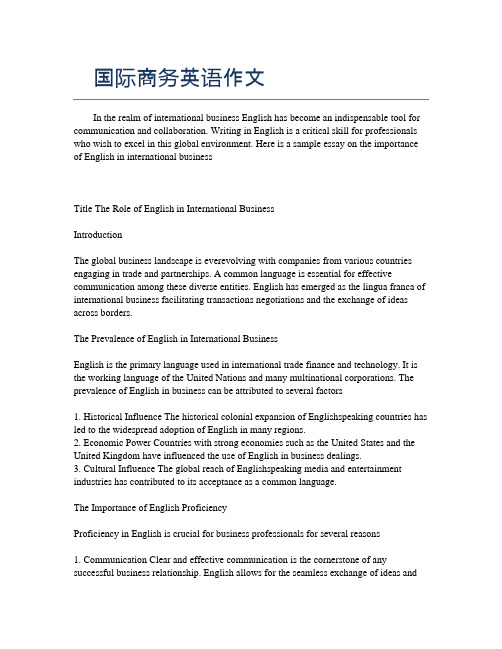
国际商务英语作文In the realm of international business English has become an indispensable tool for communication and collaboration. Writing in English is a critical skill for professionals who wish to excel in this global environment. Here is a sample essay on the importance of English in international businessTitle The Role of English in International BusinessIntroductionThe global business landscape is everevolving with companies from various countries engaging in trade and partnerships. A common language is essential for effective communication among these diverse entities. English has emerged as the lingua franca of international business facilitating transactions negotiations and the exchange of ideas across borders.The Prevalence of English in International BusinessEnglish is the primary language used in international trade finance and technology. It is the working language of the United Nations and many multinational corporations. The prevalence of English in business can be attributed to several factors1. Historical Influence The historical colonial expansion of Englishspeaking countries has led to the widespread adoption of English in many regions.2. Economic Power Countries with strong economies such as the United States and the United Kingdom have influenced the use of English in business dealings.3. Cultural Influence The global reach of Englishspeaking media and entertainment industries has contributed to its acceptance as a common language.The Importance of English ProficiencyProficiency in English is crucial for business professionals for several reasons1. Communication Clear and effective communication is the cornerstone of any successful business relationship. English allows for the seamless exchange of ideas andinformation.2. Negotiation English is often the medium for highstakes negotiations where precision and clarity are paramount.3. Documentation Contracts agreements and other official documents are frequently written in English requiring a thorough understanding of the language.Challenges and SolutionsDespite its importance not all business professionals are fluent in English. This can lead to misunderstandings and missed opportunities. To address this businesses can1. Invest in Language Training Offering English language courses to employees can improve their communication skills and overall business performance.2. Hire Multilingual Staff Employing staff who are proficient in multiple languages can bridge communication gaps.3. Use Translation Services Professional translation services can ensure that documents and communications are accurately conveyed.ConclusionIn conclusion English plays a pivotal role in international business acting as a bridge that connects companies and individuals from different linguistic backgrounds. As the world becomes increasingly interconnected the ability to communicate in English is not just an advantage but a necessity for those who wish to succeed in the global marketplace.This essay provides a comprehensive overview of why English is essential in international business and offers practical solutions for overcoming language barriers.。
国际商务英语-Inquiry, Quotation and Counter-offer

• Payment: By confirmed, irrevocable letter of credit in our favor by draft at sight to reach us one month before shipment and remain valid for negotiation in China till the 15th day after shipment. Your early order will be appreciated.
Japan and America.
• On request, a detailed offer with separate prices for the know-how, the training of your technical personnel and as well terms of payment, etc. will be available. This offer is non-firm, without engagement, and
• Sincerely yours,
国际商务英语
Ⅲ. Non-firm Offer
• Dear Sirs,
• Re: Non-firm Offer for Know-how Transferring
• In reply to your letter of August 8, we are pleased to know that you are taking great interest in our Preliminary Proposal on the transfer of our know-how for manufacturing cables with an indication price of US
为什么要选择国际商务英语作文
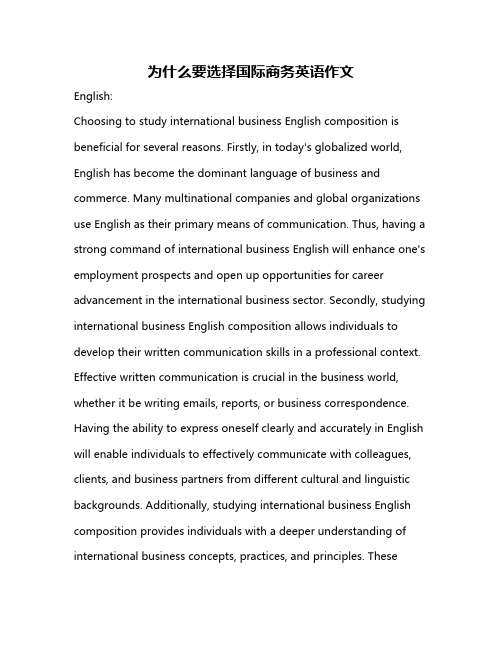
为什么要选择国际商务英语作文English:Choosing to study international business English composition is beneficial for several reasons. Firstly, in today's globalized world, English has become the dominant language of business and commerce. Many multinational companies and global organizations use English as their primary means of communication. Thus, having a strong command of international business English will enhance one's employment prospects and open up opportunities for career advancement in the international business sector. Secondly, studying international business English composition allows individuals to develop their written communication skills in a professional context. Effective written communication is crucial in the business world, whether it be writing emails, reports, or business correspondence. Having the ability to express oneself clearly and accurately in English will enable individuals to effectively communicate with colleagues, clients, and business partners from different cultural and linguistic backgrounds. Additionally, studying international business English composition provides individuals with a deeper understanding of international business concepts, practices, and principles. Thesecourses often cover topics such as cross-cultural communication, global market trends, international trade, and business strategies. Such knowledge is invaluable for individuals seeking to work in multinational companies or engage in international business ventures. Moreover, studying international business English composition allows individuals to stay updated with current trends and developments in the global business landscape, as these courses often involve analyzing case studies, reading industry journals, and engaging in discussions related to international business issues. In conclusion, choosing to study international business English composition can significantly enhance one's career prospects, improve their written communication skills, provide a deeper understanding of international business concepts, and keep them abreast of global business trends and developments.中文翻译:选择学习国际商务英语作文之所以有益处,原因有几个方面。
国际商务英语等级证书

国际商务英语等级证书The International Business English (BEC) qualification is a prestigious certificate that demonstrates an individual's ability to use English in a professional, international business context. There are three levels of the BEC - Preliminary, Vantage, and Higher - each designed to test the English language skills required in an international business environment.The BEC Preliminary is suitable for students who have achieved an elementary level of English. It tests the ability to communicate in English in practical, everyday business situations. The examination consists of a reading and writing test, a listening test, and a speaking test.The BEC Vantage is aimed at students who have a good working knowledge of English. It tests the ability to use English in a business context, with a focus on reading andwriting skills. The examination is divided into four sections, including reading, writing, listening, and speaking.The most advanced level, the BEC Higher, is designed for students who are already proficient in English and who needto use the language in a business context. The examination covers a range of business-related topics and is divided into four sections: reading, writing, listening, and speaking.Achieving the BEC qualification demonstrates to employers that an individual has the necessary language skills to succeed in an international business environment. It can open up new opportunities for career advancement and job prospects. Many multinational companies and organizations recognize the BEC qualification and may require it as part of their recruitment process.In conclusion, the International Business English (BEC) qualification is a valuable asset for anyone looking to workin an international business environment. It demonstrates ahigh level of English language proficiency and is recognized by employers worldwide. With three levels of certification available, individuals can choose the one that best suits their current language abilities and career aspirations.。
为什么要选择国际商务英语作文
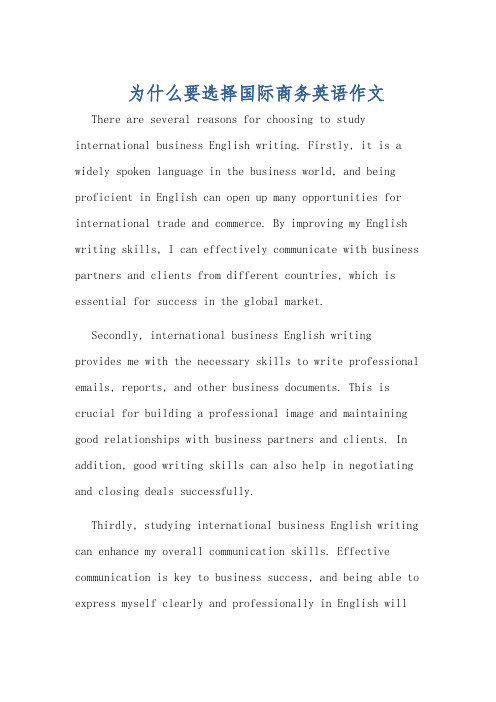
为什么要选择国际商务英语作文There are several reasons for choosing to study international business English writing. Firstly, it is a widely spoken language in the business world, and being proficient in English can open up many opportunities for international trade and commerce. By improving my English writing skills, I can effectively communicate with business partners and clients from different countries, which is essential for success in the global market.Secondly, international business English writing provides me with the necessary skills to write professional emails, reports, and other business documents. This is crucial for building a professional image and maintaining good relationships with business partners and clients. In addition, good writing skills can also help in negotiating and closing deals successfully.Thirdly, studying international business English writing can enhance my overall communication skills. Effective communication is key to business success, and being able to express myself clearly and professionally in English willgive me a competitive edge in the global business environment.Overall, choosing to study international business English writing is important for my future career prospects and will provide me with the necessary skills and knowledge to succeed in the international business arena.选择学习国际商务英语写作有几个原因。
自考国际商务英语课件

International Business English
LESSON TWO Income level and the world market
Business Knowledge
GNP and GDP are two important concepts used to indicate a country’s total income. GNP (gross national product) refers to the market value of goods and services produced by the property and labor owned by the residents of an economy.(国民原则). GDP measures the market value of all goods and services produced within the geographic area of an economy(国土原则). The major difference between them is that the former focuses on ownership of the factors of production while the latter concentrates on the place where production takes place; the former stresses the income generated by turning out the products while the latter ,the value of the products themselves. And we can use them interchangeable. Per capita income and per capita GDP Per capita income is calculated by dividing its national income by its population. per capita GDP is calculated by dividing its total GDP by its population. Per capita GDP reveals the average income level of consumers, which is important when marketing consumer durables.
“国际人才英语考试”与剑桥商务英语考试比较研究
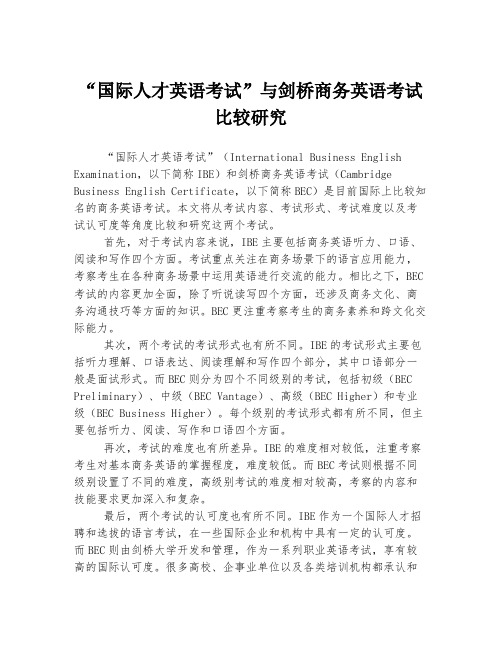
“国际人才英语考试”与剑桥商务英语考试比较研究“国际人才英语考试”(International Business English Examination,以下简称IBE)和剑桥商务英语考试(Cambridge Business English Certificate,以下简称BEC)是目前国际上比较知名的商务英语考试。
本文将从考试内容、考试形式、考试难度以及考试认可度等角度比较和研究这两个考试。
首先,对于考试内容来说,IBE主要包括商务英语听力、口语、阅读和写作四个方面。
考试重点关注在商务场景下的语言应用能力,考察考生在各种商务场景中运用英语进行交流的能力。
相比之下,BEC 考试的内容更加全面,除了听说读写四个方面,还涉及商务文化、商务沟通技巧等方面的知识。
BEC更注重考察考生的商务素养和跨文化交际能力。
其次,两个考试的考试形式也有所不同。
IBE的考试形式主要包括听力理解、口语表达、阅读理解和写作四个部分,其中口语部分一般是面试形式。
而BEC则分为四个不同级别的考试,包括初级(BEC Preliminary)、中级(BEC Vantage)、高级(BEC Higher)和专业级(BEC Business Higher)。
每个级别的考试形式都有所不同,但主要包括听力、阅读、写作和口语四个方面。
再次,考试的难度也有所差异。
IBE的难度相对较低,注重考察考生对基本商务英语的掌握程度,难度较低。
而BEC考试则根据不同级别设置了不同的难度,高级别考试的难度相对较高,考察的内容和技能要求更加深入和复杂。
最后,两个考试的认可度也有所不同。
IBE作为一个国际人才招聘和选拔的语言考试,在一些国际企业和机构中具有一定的认可度。
而BEC则由剑桥大学开发和管理,作为一系列职业英语考试,享有较高的国际认可度。
很多高校、企事业单位以及各类培训机构都承认和接受BEC考试成绩作为对商务英语能力的评估。
综上所述,IBE和BEC是两个不同的商务英语考试,考试内容和形式有所不同,难度和认可度也存在差异。
商务英语用英语怎么说
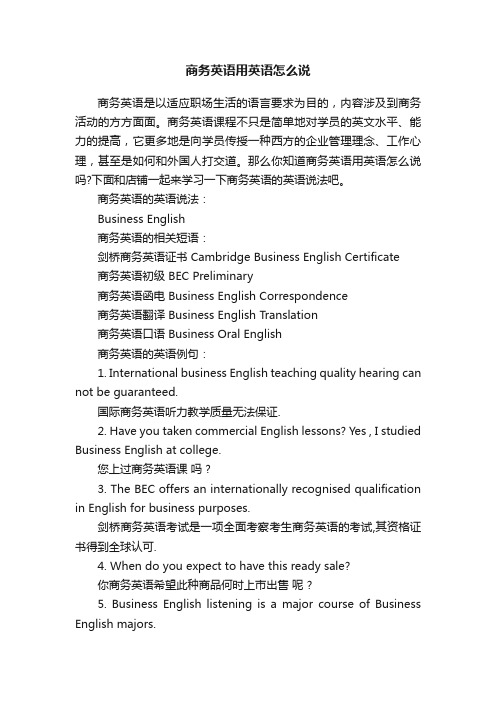
商务英语用英语怎么说商务英语是以适应职场生活的语言要求为目的,内容涉及到商务活动的方方面面。
商务英语课程不只是简单地对学员的英文水平、能力的提高,它更多地是向学员传授一种西方的企业管理理念、工作心理,甚至是如何和外国人打交道。
那么你知道商务英语用英语怎么说吗?下面和店铺一起来学习一下商务英语的英语说法吧。
商务英语的英语说法:Business English商务英语的相关短语:剑桥商务英语证书 Cambridge Business English Certificate商务英语初级 BEC Preliminary商务英语函电 Business English Correspondence商务英语翻译 Business English Translation商务英语口语 Business Oral English商务英语的英语例句:1. International business English teaching quality hearing can not be guaranteed.国际商务英语听力教学质量无法保证.2. Have you taken commercial English lessons? Yes , I studied Business English at college.您上过商务英语课吗 ?3. The BEC offers an internationally recognised qualification in English for business purposes.剑桥商务英语考试是一项全面考察考生商务英语的考试,其资格证书得到全球认可.4. When do you expect to have this ready sale?你商务英语希望此种商品何时上市出售呢 ?5. Business English listening is a major course of Business English majors.商务英语听力是商务英语专业的一门重要课程.6. Washington English School will give a compulsory lecture on BEC next week.下周,华盛顿英语学校将要举办一次关于商务英语的公益讲座.7. Our textbook is New International Business English published by Cambridge University Press.我们的教材是采用剑桥大学出版社出版的《新国际商务英语》.8. We look forward to your settlement at early date.商务英语培训语句-希望你们尽早进行结算.9. Besides , they prefer textbooks in original English standard language input.学生对商务英语教材不太满意, 更希望使用语言地道的原版教材.10. Michael: I can't wait to learn more Business English.迈克尔: 学习更多的商务英语,太好了,我都等不及了.11. Vocational school or collage degree , major of business English or secretary.职业学校或大专以上学历, 商务英语或秘书专业.12. So leave business background about business English learning is of no significance.所以离开商务背景谈商务英语学习是没有意义的.13. Business writing classes are also available for groups or individuals.同时,我们也为团体或个人提供商务英语写作课程.14. Billy: I am always ready to learn some new business English.比利: 我总是准备着学习一些新的商务英语.15. I have a Cambridge Business English Certificate.我有剑桥商务英语证书.。
国际商务英语学习计划模板
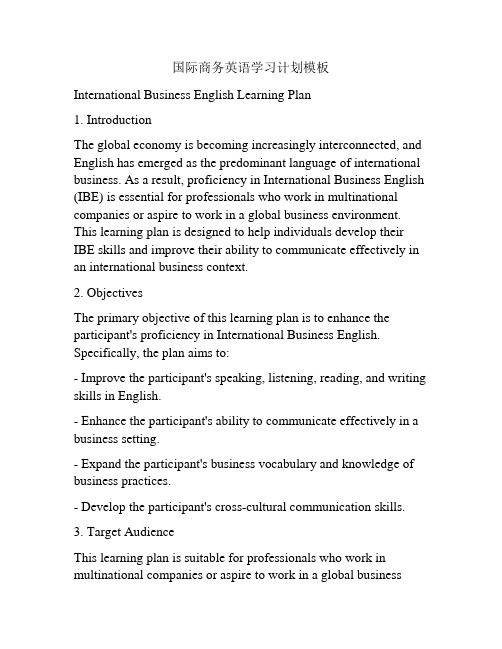
国际商务英语学习计划模板International Business English Learning Plan1. IntroductionThe global economy is becoming increasingly interconnected, and English has emerged as the predominant language of international business. As a result, proficiency in International Business English (IBE) is essential for professionals who work in multinational companies or aspire to work in a global business environment. This learning plan is designed to help individuals develop their IBE skills and improve their ability to communicate effectively in an international business context.2. ObjectivesThe primary objective of this learning plan is to enhance the participant's proficiency in International Business English. Specifically, the plan aims to:- Improve the participant's speaking, listening, reading, and writing skills in English.- Enhance the participant's ability to communicate effectively in a business setting.- Expand the participant's business vocabulary and knowledge of business practices.- Develop the participant's cross-cultural communication skills. 3. Target AudienceThis learning plan is suitable for professionals who work in multinational companies or aspire to work in a global businessenvironment. It is also appropriate for university students who are studying business or related fields and wish to improve their English communication skills.4. Learning MethodsThe learning plan will utilize a variety of methods to help participants develop their IBE skills, including:- Classroom instruction: Participants will attend classes to learn and practice English language skills, business vocabulary, and cross-cultural communication strategies.- Language practice: Participants will engage in speaking and writing practice exercises to improve their fluency and accuracy in English.- Business case studies: Participants will analyze and discuss real-world business cases to improve their business communication skills and decision-making abilities.- Cultural immersion: Participants will engage in activities that promote cross-cultural understanding and awareness.- Self-study: Participants will be encouraged to engage in self-study activities, such as reading business articles, listening to business podcasts, and practicing English language skills outside of the classroom.5. Learning ContentThe learning plan will cover a range of topics related to International Business English, including:- Business communication: Participants will learn how to write professional emails, reports, and presentations, as well as honetheir speaking and listening skills for business meetings and negotiations.- Business vocabulary: Participants will expand their vocabulary related to finance, marketing, operations, and other areas of business, as well as learn idiomatic expressions commonly used in business settings.- Cross-cultural communication: Participants will learn about different cultural communication styles, business etiquette, and how to navigate cross-cultural challenges in a global business environment.- Business writing: Participants will improve their ability to write clear, concise, and persuasive business documents, including emails, reports, and proposals.- Business speaking: Participants will practice speaking in a business context, such as making presentations, participating in meetings, and negotiating with clients or colleagues.6. AssessmentParticipants' progress will be assessed through a combination of quizzes, exams, presentations, and written assignments. The assessments will be designed to evaluate participants' language skills, business knowledge, and ability to communicate effectively in a business setting. Feedback will be provided to participants to help them identify areas for improvement and track their progress over time.7. DurationThe learning plan will be conducted over a period of 6 months, with classes held twice a week for 2 hours each session. In addition to classroom instruction, participants will be expected to engage in self-study activities outside of class hours to reinforce their learning.8. ResourcesParticipants will have access to a variety of resources to support their learning, including:- Textbooks and study materials: Participants will be provided with textbooks and study materials to help them develop their IBE skills and business knowledge.- Online resources: Participants will have access to online resources, such as language learning platforms, business articles, and case studies, to supplement their learning.- Language practice materials: Participants will have access to speaking and writing practice materials, such as conversation prompts, role-plays, and business writing exercises, to improve their language skills.- Business simulations: Participants will have the opportunity to engage in business simulations to apply their language and business skills in a realistic business setting.9. ConclusionThis learning plan is designed to help participants develop their International Business English skills and become more effective communicators in a global business environment. By improving their language proficiency, business knowledge, and cross-culturalcommunication skills, participants will be better prepared to succeed in international business and advance their careers.。
剑桥国际商务英语课程大纲

剑桥国际商务英语课程大纲一,课程名称剑桥国际商务英语New International Business English开课人卢桂华讲师二,学时学分32学时2学分三,课程类别选修课四,课程教材华夏出版社剑桥国际商务英语New International Business English 2001五,参考教材复旦大学出版社李兰欣剑桥国际商务英语应试指导2003六,开课单位外语学院七,课程目的,性质和任务在学生学完基础阶段英语之后,为那些将来毕业之后有可能或乐意从事对外商务活动的同学提供的一种实用性针对性较强的英语提高课程.在本课程中,学生将接触到大量的以英语为工作语言的商务背景和商务情景.,联系和提高英语沟通技能,使学生在未来的商务活动中更自信,更流利,也更准确.八,课程的主要内容全课程包括16个单元1)会面2) 信件传真和备忘录3)通电话4)总结,笔记,报告5)一起工作6)国际贸易保护主义7)货币贸易保护主义8)处理问题9) 访问者和旅游者10)市场营销11)会谈纪要12)工作过程和操作13)工作和职业14) 销售和谈判15)一个特别的项目其中1-4 单元介绍基本的商务英语技巧,5-14单元是一些综合活动,第15单元采用模拟方式复习所学内容.九,课程的教学基本要求学生要通过阅读,听,写,讨论,解决问题和角色扮演等课堂活动,达到基本的运用英语沟通,协调和解决问题的能力.强调语言的应用能力.十,说明需录音机一台十一,考核方式平时成绩50%加闭卷考试50%十二,学时分配2学时/周共16周大纲制订者:卢桂华大纲审定者:邹晓玲剑桥国际商务英语1 课程中文名称剑桥国际商务英语New International Business English开课人卢桂华讲师2 学时学分32学时2学分3 课程类别选修课4 预修课程大学英语5内容简介全课程包括16个单元1)会面2) 信件传真和备忘录3)通电话4)总结,笔记,报告5)一起工作6)国际贸易保护主义7)货币贸易保护主义8)处理问题9) 访问者和旅游者10)市场营销11)会谈纪要12)工作过程和操作13)工作和职业14) 销售和谈判15)一个特别的项目其中1-4 单元介绍基本的商务英语技巧,5-14单元是一些综合活动,第15单元采用模拟方式复习所学内容.学生要通过阅读,听,写,讨论,解决问题和角色扮演等课堂活动,达到基本的运用英语沟通,协调和解决问题的能力.强调语言的应用能力.6 课程教材剑桥国际商务英语New International Business English华夏出版社20017 参考书复旦大学出版社李兰欣剑桥国际商务英语应试指导20038 选课对象已通过英语四级的本科生研究生9 开课单位外语学院商务英语阅读课程教学大纲一、课程名称:《商务英语阅读》(English Readings in International Business)课程负责人:朱万忠二、学时与学分:32学时2学分三、课程类别:文化素质教育选修课四、课程教材:陈苏东,陈建平主编,《商务英语阅读》,北京:高等教育出版社,2002五、参考教材:熊伟编著, 《国际贸易实务英语》,武汉:武汉大学出版社,2001六、开课单位:重庆大学外国语学院七、课程的目的、性质和任务“商务英语阅读”使实用性很强的课程,以西方报刊中报到和论述国际商务的文章为主要内容,集英语语言学习和国际商务知识的传授为一体,通过有指导的阅读和训练,使学生掌握这类文章的文体、语言和内容特点,提高语言理解和欣赏能力,培养学生收集、整理和研究国际商务信息的能力,锻炼其逻辑思维能力,扩大其国际商务背景知识。
国际商务英语毕业论文(英文)
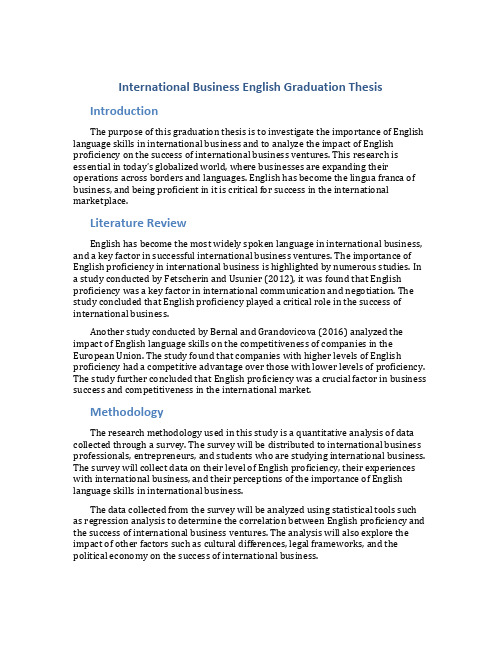
International Business English Graduation Thesis IntroductionThe purpose of this graduation thesis is to investigate the importance of English language skills in international business and to analyze the impact of English proficiency on the success of international business ventures. This research is essential in to day’s globalized world, where businesses are expanding their operations across borders and languages. English has become the lingua franca of business, and being proficient in it is critical for success in the international marketplace.Literature ReviewEnglish has become the most widely spoken language in international business, and a key factor in successful international business ventures. The importance of English proficiency in international business is highlighted by numerous studies. In a study conducted by Fetscherin and Usunier (2012), it was found that English proficiency was a key factor in international communication and negotiation. The study concluded that English proficiency played a critical role in the success of international business.Another study conducted by Bernal and Grandovicova (2016) analyzed the impact of English language skills on the competitiveness of companies in the European Union. The study found that companies with higher levels of English proficiency had a competitive advantage over those with lower levels of proficiency. The study further concluded that English proficiency was a crucial factor in business success and competitiveness in the international market.MethodologyThe research methodology used in this study is a quantitative analysis of data collected through a survey. The survey will be distributed to international business professionals, entrepreneurs, and students who are studying international business. The survey will collect data on their level of English proficiency, their experiences with international business, and their perceptions of the importance of English language skills in international business.The data collected from the survey will be analyzed using statistical tools such as regression analysis to determine the correlation between English proficiency and the success of international business ventures. The analysis will also explore the impact of other factors such as cultural differences, legal frameworks, and the political economy on the success of international business.Results and AnalysisThe results of the survey indicate that English proficiency is a significant factor in the success of international business ventures. Over 80% of the respondents believed that English proficiency was necessary to communicate effectively with international business partners. The study also found that companies with high levels of English proficiency had a competitive advantage over those with lower levels of proficiency.The regression analysis showed that English proficiency had a positive and statistically significant effect on the success of international business ventures. The analysis also found that cultural differences, legal frameworks, and the political economy had a significant impact on the success of international business, but their effects were moderated by English proficiency.Conclusion and RecommendationsThe study confirms that English proficiency is an essential skill for success in international business. The research findings suggest that companies should invest in English language training for their employees and develop strategies to increase their English proficiency levels. This investment will enable companies to communicate effectively with international business partners, increase their competitiveness, and succeed in the global market.Furthermore, policymakers should promote English language education and training programs to develop a skilled workforce for the global market. English language education should be made accessible and affordable to all, to promote equal opportunities and participation in the global economy.In conclusion, this research highlights the critical importance of English proficiency in international business and underscores the need for more research to explore the impact of other factors such as cultural differences, legal frameworks and the political economy on the success of international business.。
商务英语类书籍

商务英语是指在商业环境中使用的英语语言技能。
这包括书写商业信函、报告、演讲、参加商务会议以及其他与商务相关的交流活动。
学习商务英语是提高职业素质和在商业领域取得成功的关键之一。
以下是一些推荐的商务英语类书籍,这些书籍涵盖了商务英语的各个方面,从基础知识到高级技能,都有所涉及。
1. **《Business Vocabulary in Use》by Bill Mascull:**这本书是商务英语词汇的绝佳资源,适用于各个水平的学习者。
它包含了与商务相关的常用词汇,每个单元都有练习题,帮助读者巩固所学内容。
2. **《Effective Business Writing: A Guide For Those Who Write On The Job》by Maryann V. Piotrowski:**有效的商务写作对于在职场中取得成功至关重要。
这本书提供了关于如何写出清晰、有力和专业的商业文件的实用指导,包括电子邮件、报告和其他商务文档。
3. **《English for Business Communication》by Simon Sweeney:**本书旨在帮助学习者提高其商务交流的技能,包括口头和书面表达。
它涵盖了商务英语的基本原则,同时提供了大量的练习和案例,帮助读者应对不同的商务场景。
4. **《International Business English》by Leo Jones:**针对国际商务环境的书籍,适用于需要在国际范围内进行业务交流的专业人士。
它覆盖了跨文化沟通、商务会议、商务招待等主题,为读者提供了跨足国界的商务英语技能。
5. **《Oxford Handbook of Commercial Correspondence》by A. Ashley:**商务信函是商务交流中的基本组成部分。
这本手册提供了丰富的商务信函样本,涵盖了各种场景,从询价信到邀请函,使读者能够学习如何以专业、得体的方式书写商务信函。
国际商务英语二级证书
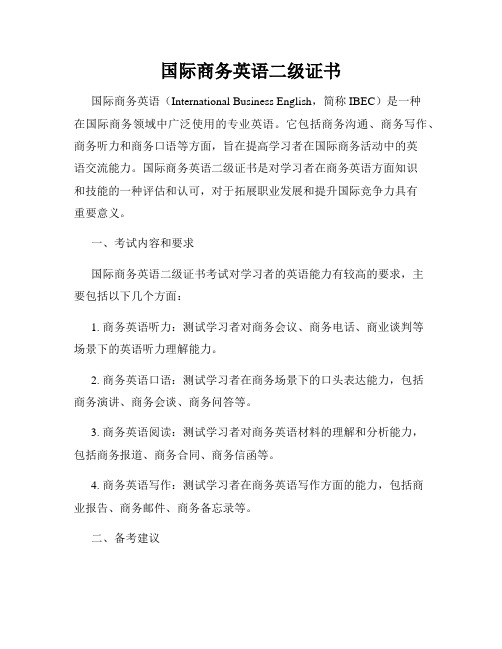
国际商务英语二级证书国际商务英语(International Business English,简称IBEC)是一种在国际商务领域中广泛使用的专业英语。
它包括商务沟通、商务写作、商务听力和商务口语等方面,旨在提高学习者在国际商务活动中的英语交流能力。
国际商务英语二级证书是对学习者在商务英语方面知识和技能的一种评估和认可,对于拓展职业发展和提升国际竞争力具有重要意义。
一、考试内容和要求国际商务英语二级证书考试对学习者的英语能力有较高的要求,主要包括以下几个方面:1. 商务英语听力:测试学习者对商务会议、商务电话、商业谈判等场景下的英语听力理解能力。
2. 商务英语口语:测试学习者在商务场景下的口头表达能力,包括商务演讲、商务会谈、商务问答等。
3. 商务英语阅读:测试学习者对商务英语材料的理解和分析能力,包括商务报道、商务合同、商务信函等。
4. 商务英语写作:测试学习者在商务英语写作方面的能力,包括商业报告、商务邮件、商务备忘录等。
二、备考建议为了能够顺利通过国际商务英语二级证书考试,以下是一些建议供大家参考:1. 词汇和语法:开展词汇和语法的系统复习是考试备考的基础。
记忆并熟练掌握商务英语中常用的词汇和句型,加强对语法知识的理解和应用。
2. 听力训练:通过大量听取商务英语材料,提高听力理解能力。
积极参与商务英语对话和讨论,锻炼自己的口语表达能力。
3. 阅读习惯:阅读商务英语相关文章,培养商务英语阅读理解的习惯。
注意理解文章的中心思想、结构和观点,并能准确理解文章中的关键信息。
4. 写作技巧:学习商务英语写作的基本技巧,包括书信写作、报告写作和备忘录写作等。
注意商务英语写作中的格式要求,例如合同的书写格式。
5. 模拟测试:进行模拟测试,了解自己的备考水平和弱点,针对性地进行复习和提高。
三、证书的意义国际商务英语二级证书的获得对于个人和职业发展有着重要的意义。
它不仅能够证明个人具备一定的商务英语水平,还能够提高个人在国际商务活动中的竞争力和沟通能力。
国际商务英语 International Business English

ⅱ、What is International Business English? 什么是国际商务英语?国际商务英语,指的是人们从事国际商务活动中所使用的具有行业特征的英语,这些行业包括:国际贸易、国际金融、国际会计、国际运输、国际商法、保险、银行、经济、营销、物流、企业管理、商业服务等。
由此看来,商务英语不是一种独立的语言,它仍然是英语,是在国际商务背景下使用的英语。
ⅲ、How to learn International Business English? 怎样学习国际商务英语?掌握一定的商务英语词汇、短语和句型。
(1) 词汇方面commerciale.g. The TV show was interrupted by too many commercials.prospecte.g. He called on some prospects but failed to make a sale.makee.g. These products are of Chinese make.The factory manufactured five makes of tractors.(2) 短语方面soft selling hard sellingSome sales people adopt a direct ‘hard sell' approach, while others use a more indirect ‘soft sell' approach.have a bad yearThe corporation is having a bad year and it will probably be necessary to dismiss a few office staff.break into/penetrate the marketThere is chance that we'll manage to break into the UK market(3) 句型方面I am writing to you concerning…You can't miss it. I can't agree more. It may have slipped your mind, but…You can always reach me at the number…We would very much appreciate it if you could…I noted with interest your advertisement for…Yes, that's true, but on the other hand… That's exactly what I think. Maybe, but don't you think…? You are wanted on the phone. As requested, we enclose for your attention…(4) 旧词“新义“honoure.g, All credit cards honoured here. The bank honoured this cheque.covere.g. I have got myself covered against fire.royaltye.g. Besides copyright, the writer got a 10 percent royalty on sales. The technology transfer fee shall be paid in royalties.(5) 同义词、近义词、相似词的辨析。
剑桥商务英语PPT课件

11:15 收听力答题卡和试卷
下午: 13:00 口试 大致12分钟
考试评分标准
BEC preliminary听、说、读 和写四个部分。每一部分各 占25%,总分为100。 通过成绩有2个: 优秀 (pass with Merit)和通过 (pass) 未通过成绩有1个: 不及格 介绍通过率: 参加考试的学生会在7周后收 到成绩单。通过考试的学生 会在收到成绩单4周后得到考 试合格证书。
If you need to be exact you can say: ten a.m. or ten in the morning and ten p.m. or
ten at night You can also tell the time in this way: 1.00 one o’clock 3.10 ten past
• Have you got any money on you?
• Do you have any money on you?
4.商务英语考试注意事项、时间和 评分标准
考试注意事项、时间和评分标准: 1. 考试注意事项 BEC 考试: 1)请携带准考证、身份证。 2) 带2B或HB铅笔及橡皮,考试过程
注意事项
8:40 必须进考场 8:50 考官发阅读和写作答题卡并请考生确认后签名 8:55 发阅读和写作试卷并请考生填写考生姓名、中心考号和考
生考号 9:00 开始做阅读写作试卷 10:30 考官宣布停笔,收阅读和写作答题卡和试卷(阅读和写作
这60分钟既包括做题也包括把答案填到 答题卡的时间) 10:35 听力考试 (听力录音播放两遍30分钟,然后再给10分钟
Vantage Class.
1) .本课程采用经济科学出版社出版的《新编剑 桥商务英语(初\中\高级)学生用书》(第二 版)。该书的第二版是专门针对BEC商务英语 考试大纲做出更改后专门编写的,内容既与考 试相关,更与现代商务活动息息相关,对你在 商务领域大有帮助。
国际商务英语简要和课后答案
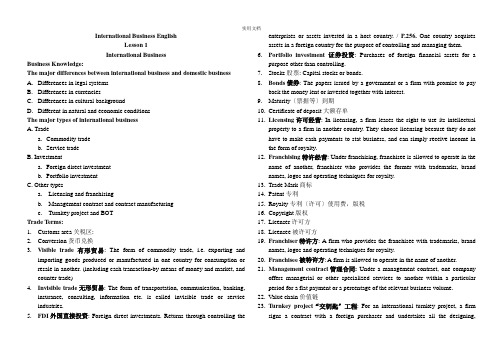
International Business EnglishLesson 1International BusinessBusiness Knowledge:The major differences between international business and domestic businessA.Differences in legal systemsB.Differences in currenciesC.Differences in cultural backgroundD.Different in natural and economic conditionsThe major types of international businessA. Trademodity tradeb.Service tradeB. Investmenta.Foreign direct investmentb.Portfolio investmentC. Other typesa.Licensing and franchisingb.Management contract and contract manufacturingc.Turnkey project and BOTTrade Terms:1.Customs area关税区:2.Conversion货币兑换3.Visible trade有形贸易: The form of commodity trade, i.e. exporting andimporting goods produced or manufactured in one country for consumption or resale in another. (including cash transaction-by means of money and market, and counter trade)4.Invisible trade无形贸易: The form of transportation, communication, banking,insurance, consulting, information etc. is called invisible trade or service industries.5.FDI外国直接投资: Foreign direct investments. Returns through controlling theenterprises or assets invested in a host country. / P.256.One country acquires assets in a foreign country for the purpose of controlling and managing them.6.Portfolio investment证券投资: Purchases of foreign financial assets for apurpose other than controlling.7.Stocks股票: Capital stocks or bonds.8.Bonds债券: The papers issued by a government or a firm with promise to payback the money lent or invested together with interest.9.Maturity〔票据等〕到期10.Certificate of deposit大额存单11.Licensing许可经营: In licensing, a firm leases the right to use its intellectualproperty to a firm in another country. They choose licensing because they do not have to make cash payments to stat business, and can simply receive income in the form of royalty.12.Franchising特许经营: Under franchising, franchisee is allowed to operate in thename of another, franchiser who provides the former with trademarks, brand names, logos and operating techniques for royalty.13.Trade Mark商标14.Patent专利15.Royalty专利〔许可〕使用费,版税16.Copyright版权17.Licenser许可方18.Licensee被许可方19.Franchiser特许方: A firm who provides the franchisee with trademarks, brandnames, logos and operating techniques for royalty.20.Franchisee被特许方: A firm is allowed to operate in the name of another.21.Management contract管理合同: Under a management contract, one companyoffers managerial or other specialized services to another within a particular period for a flat payment or a percentage of the relevant business volume.22.Value chain价值链23.Turnkey project“交钥匙〞工程: For an international turnkey project, a firmsigns a contract with a foreign purchaser and undertakes all the designing,contracting and facility equipping before handing it over to the latter upon completion.24.BOT建设、经营和移交: Build, Operate, Transfer25.Expertise专门知识26.Bonus红利、奖金、津贴27.Royalty 许可使用费28.International investment国际投资: Supplying capital by residents of onecountry to another.29.Contract manufacturing承包生产30.GATT关贸总协定: General Agreement on Tariffs and Trade31.International business国际商务: Transaction between parties from differentcountries. Sometimes business across the borders of different customs areas of the same country is also regarded as import and export.32.Intellectual property知识产权33.Oil deposit: 石油储藏= oil reserves34.the reserves of natural resources 自然资源储藏35.Personal advancement个人的晋升,个人素质的提高以及个人事业的进步等。
- 1、下载文档前请自行甄别文档内容的完整性,平台不提供额外的编辑、内容补充、找答案等附加服务。
- 2、"仅部分预览"的文档,不可在线预览部分如存在完整性等问题,可反馈申请退款(可完整预览的文档不适用该条件!)。
- 3、如文档侵犯您的权益,请联系客服反馈,我们会尽快为您处理(人工客服工作时间:9:00-18:30)。
International Business English国际商务英语Lesson 1 International Business第一课国际商务*International business refers to transaction between parties from different countries. Sometimes business across the borders of different customs areas of the same country is also regarded as import and export, such as business between Hong Kong and Taiwan.*International business involves more factors and thus is more complicated than domestic business. The following are some major differences between the two.1). The countries involved often have different legal systems, and one or more parties will have to adjust themselves to operate in compliance with the foreign law.2). Different counties usually use different currencies and the parties concerned will have to decide which currency to use and do everything necessary as regards conversion etc. Uncertainties and even risks are often involved in the use of a foreign currency.3).Cultural differences including language, customs, traditions, religion, value, behaviour etc. often constitute challenges and even traps for people engaged in international business.4). Countries vary in natural and economic conditions and may have different policies towards foreign trade and investment, making international business more complex than domestic business.*With the development of economic globalisation, few people or companies can completely stay away from international business. Some knowledge in this respect is necessary both for the benefit of enterprises and personal advancement.*International business first took the form of commodity trade, i.e. exporting and importing goods produced or manufactured in one country for consumption or resale in another. This form of trade is also referred to as visible trade. Later a different kind of trade in the form of transportation, communication, banking, insurance, consulting, information etc. gradually became more and more important. This type of trade is called invisible trade. Today, the contribution of service industries of the developed countries constitutes over 60% of their gross domestic products and account for an increasing proportion of world trade. *Another important form of international business is supplying capital by residents of one country to another, known as international investments.Such investments can be classified into two categories. The first kind of investments, foreign direct investments or FDI for short is made for returns through controlling the enterprises or assets invested in in a host country.*The host country is a foreign country where the investor operates, while the country where the headquarters of the investor is located is called the home country. The second kind of investment, portfolio investment, refers to purchases of foreign financial assets for a purpose other than controlling. Such financial assets may be stocks, bonds or certificates of deposit.Stocks are also called capital stocks or bonds. Bonds are papers issued by a government or a firm with promise to pay back the money lent or invested together with interest. The maturity period of a bond is at least one year, often longer, for example five, or even ten years. Certificates of deposit generally involve large amounts, say 25 thousand US dollars *Besides trade and investment, international licensing and franchising are sometimes taken as a means of entering a foreign market. In licensing, a firm leases the right to use its intellectual property to a firm in another country. Such intellectual property may be trademarks, brand names, patents, copyrights or technology. Firms choose licensing because they do not have to make cash payments to start business, and can simply receive income in the form of royaltyBesides, they can benefit from locational advantages of foreign operation without any obligations in ownership or management. The use of licensing is particularly encouraged by high customs duty and non-tariff barriers on the part of the host country. However it is not advisable to use licensing in countries with weak intellectual property protection since the licensor may have difficulty in enforcing licensing agreement.*Franchising can be regarded as a special form of licensing. Under franchising, a firm, called the franchisee, is allowed to operate in the name of another, called the franchiser who provides the former with trademarks, brand names, logos, and operating techniques for royalty. In comparison with the relation between the licenser and the licensee, the franchiser has more control over and provides more support for the franchisee.*The franchiser can develop internationally and gain access to useful information about the local market with little risk and cost, and the franchisee can easily get into a business with established products or services. Franchising is fairly popular especially in hotel and restaurant business.*Other forms for participating in international business are management contract, contract manufacturing, and turnkey project.*Under a management contract, one company offers managerial or other specialized services to another within a particular period for a flatpayment or a percentage of the relevant business volume. Sometimes bonuses based on profitability or sales growth are also specified in management contracts.Government policies often have a lot to do with management contracts. When a government forbids foreign ownership in certain industries it considers to be of strategic importance but lacks the expertise for operation, management contracts may be a practical choice enabling a foreign company to operate in the industry without owning the assets*By contract manufacturing, a firm can concentrate on their strongest part in the value chain, e.g. marketing, while contracting with foreign companies for the manufacture of their products. Such firms can reduce the amount of their resources devoted to manufacture and benefit from location advantages from production in host countries. However, loss of control over the production process may give rise to problems in respect of quality and time of delivery.*For an international turnkey project, a firm signs a contract with a foreign purchaser and undertakes all the designing, contracting and facility equipping before handing it over to the latter upon completion. Such projects are often large and complex and take a long period to complete. Payment for a turnkey project may be made at fixed total price or on a cost plus basis. The latter way of payment shifts the burden of possible additional cost over the original budget onto the purchaser *BOT is a popular variant of the turnkey project where B stands for Build, O for operate and T for transfer. For a BOT project, a firm operate a facility for a period of time after building it up before finally transferring it to a foreign company. Making profit from operating the project for a period is the major difference between BOT and the common turnkey project. Needless to say, the contractor has to bear the financial and other risks that may occur in the period of operation.*Some Words and Expressionscustoms area 关税区in compliance with 遵从,遵照conversion n.货币兑换visible trade 有形贸易resale n.转售invisible trade 无形贸易gross domestic product 国内生产总值for short 缩写为account for 占……比例headquarters n.总部trap n.陷阱,圈套portfolio investment 证券投资stocks n.股票bonds n.债券maturity n.(票据等)到期,到期日certificate of deposit 大额存单other than 而不是licensing n.许可经营franchising n.特许经营n.商标advisable adj.可行的,适当的patent n.专利royalty n.专利使用费,许可使用费,版税copyright n.版权licensor n.给予许可的人licensee n.接受许可的人franchiser n.给予特许的人franchisee n.接受特许的人logo n.标识,标记management contract 管理合同expertise n.专门知识bonus n.红利,奖金,津贴flat adj.一律的,无变动的contract manufacturing 承包生产value chain 价值链turnkey project 交钥匙工程BOT(Build, Operate, Transfer)建设,经营,移交Stand for 表示,代表variant n.变形,变体Lesson twoIncome Level and the World Market第二课收入水平和世界市场This lesson discusses the relation between the income level and the market potential, and the features of high income, middle income and low income markets.Special analysesare made on Triad, i.e. the markets of North America, European Union and Japan, as well as other markets that are closely related with China.The first two paragraphs mainly deal with GNP and GDP, two important concepts usedto indicate the total size of an economy. GDP, Gross Domestic Product, stresses the place of production while GNP, Gross National Product, on the ownership of production factors.GDP is used by most countries now where as GNP was more popular before the 1990s. The actual figures of a country’s GNP and GDP are, however, quite similar in most cases and we can use whichever figure that is available.TEXT:In assessing the potential of a market, people often look at its income level since it provides clues about the purchasing power of its residents. The concepts national income and national product have roughly the same value and can be used interchangeably if our interest is in their sum total which is measured as the market value of the total output of goodsand services of an economy in a given period, usually a year. The differenceis only in their emphasis. The former stresses the income generated by turning out the products while the latter, the value of the product s themselves. Gross National Product, GNP, and Gross Domestic Product, GDP, are two important concepts used to indicate a country’s total income. GNP refers to the market value of goods and services produced by the property and labor owned by the residents of an economy. This term was used by most governments before the 1990s国民生产总值(GNP)是最重要的宏观经济指标,它是指一个国家地区的国民经济在一定时期(一般1年)内以货币表现的全部最终产品(含货物和服务)价值的总和。
